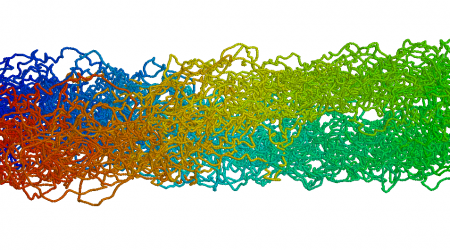A round-up of recent research from the John Innes Centre from summer 2019
Rapid gene-cloning technique will transform crop disease protection
Researchers have pioneered a new method which allows them to recruit disease-resistance genes from wild plants rapidly and transfer them into domestic crops.
The technique, called AgRenSeq, or speed cloning, has been developed by John Innes Centre researchers alongside colleagues in the United States and Australia to speed up the fight against pathogens that threaten food crops worldwide. It is a blend of two technologies: association genetics, which allows researchers to identify associations between genome regions and disease-resistant traits across many individual plants; and sequence capture, which allows targeting of specific regions of the genomeencoding immune receptor proteins. This makes it a cost-effective alternative to whole-genome sequencing.
The winter weather window that costs UK rapeseed growers millions
Based on analysis of climate and yield data stretching back 25 years, Professor Steven Penfield and colleagues found that UK rapeseed growers lose up to 25% of their annual yield because of temperature rises during an early-winter weather window.
Research shows that a 1 °C rise in temperature during this volatile weather period costs growers £16m in lost income when the crop is harvested. The researchers ranked oilseed rape varieties according to the stability of their annual yield, and genetic analysis showed that the trait of yield stability is not correlated with that of yield. Professor Penfield said, “This means it should be possible to breed for yield stability and high yields together without having to sacrifice one for the other.
Plants and the art of microbial maintenance
It’s been known for centuries that plants produce a diverse array of medically valuable chemicals in their roots. Research has revealed now that plants use these chemicals to muster and maintain communities of microbes.
Professor Anne Osbourn’s lab, in collaboration with Professor Yang Bai of the Chinese Academy of Sciences, generated plants altered in the production of root-derived chemicals. The results showed differences in the microbia communities compared with wild plants. This offers the potential to design improved crops or to engineer the root microbiome for enhanced productivity and sustainability and move away from fertilisers and pesticides.
Surprise findings turn up the heat on the study of vernalisation
Vernalisation is the process by which plants require prolonged exposure to cold temperature before they transition from the vegetative state to flower. New research has shown that vernalisation in the field is influenced by warm conditions as well as cold, and over a much wider temperature range than previously thought.
The researchers exposed 98 wheat cultivars and landraces to temperatures ranging from 13 °C to 25 °C in controlled environments. They found one cultivar, Charger, which did not follow the standard response of accelerated growth under warmer conditions. Using this, they identified a floral activator gene and found responses to high temperatures as well as periods of cold effect vernalisation.
This knowledge offers the potential for breeding new wheat cultivars that are more robust to changing temperatures.
How Capsella followed its lonely heart
Capsellae have heart-shaped seed pods, but the molecular mechanism behind the distinctive shape has always been a mystery. Research has shown that a gene called INDEHISCENT (IND) is responsible for the characteristic shape.
Previously characterised in Arabidopsis, they found that this gene regulates the plant hormone auxin to create maxima that generate the distinctive shape. The findings support a growing number of studies in developmental biology which show that changes in regulatory DNA sequence in key controlling genes such as IND can lead to diverse expression patterns responsible for changes in organ shape both in natural evolution and in crop domestication.








